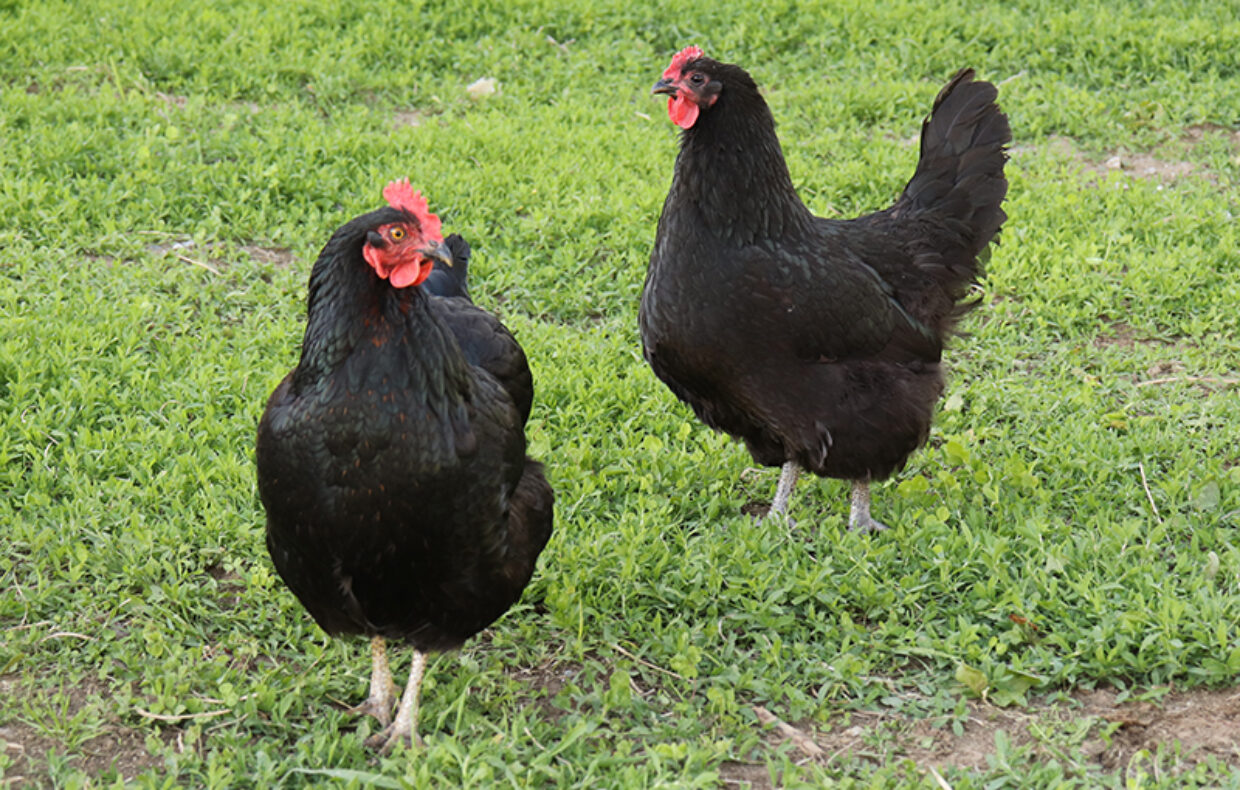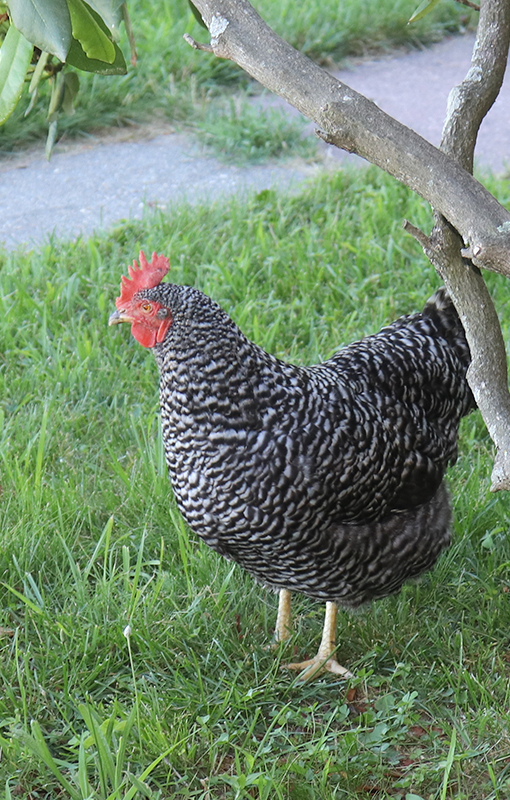Raising Layer Hens for Eggs

 For as long as I can remember I have always wanted to be a farmer. My parents, however, convinced me that there was no money in farming, and I should look elsewhere for a career if I ever wanted a decent income.
For as long as I can remember I have always wanted to be a farmer. My parents, however, convinced me that there was no money in farming, and I should look elsewhere for a career if I ever wanted a decent income.
And I did…
But the little niggle in the back of my brain would never go away.
As soon as I could, I bought a home in the country. Except for a short period of time, that is where I have stayed. It wasn’t until 2013 when Dennis and I bought our little farmstead that I was finally able to give real farming a try. Oh, I haven’t given up my “day job,” but that doesn’t mean I can’t enjoy the finer parts of farming.
I’ve avoided writing about farming as I never considered myself an “expert.” Then I thought that most people who know how to farm probably don’t consider themselves experts, either. (Well, I can think of one or two exceptions.) A friend once asked me how long I had been raising chickens, to which I answered, “on and off for about forty years.” And that doesn’t make you an expert, they asked? Well, maybe in raising chickens. Still, I cannot say I have run across every scenario someone raising chickens might run into. I can at least provide information on getting started.
Ever since I was a teenager, I’ve raised laying hens. Rhode Island Reds were my favorites although nowadays I like to keep a variety of colorful hens around. Nothing makes me happier than watching my hens scratch around the yard, eating ticks and bugs and fertilizing along the way. They are indeed the pet that poops breakfast.
Raising chickens is not difficult but it does come with challenges sometimes. I think I was on my third or fourth new batch of chicks before I ever lost a baby and it was totally my fault. We had a cat who was a good hunter and seeing those little chicks in the old rabbit cage was just too tempting. I came home one day to find one of the chicks on the outside of the cage. I am quite sure our cat figured out how to reach in with his paw and pull the chick through the bars of the cage. As you can imagine, the chick did not survive the extraction. From then on, I learned to keep any new chicks in a secure area away from the cat.
Later, when the hens were full grown, the same cat would hide behind a bush and dash out at the passing hens, making them scatter. At this point, the hens were too big for him to do any harm, but he was quite smitten with himself every time he made them run.
Since then I have had many chicks on the farm, both layers and broilers and even a few turkey poults. We have lost our share of chicks but have gained a fair bit of knowledge.
Purchasing your chicks:
There are many ways to purchase chicks. You can order online, buy through a feed store or find a local breeder. I have gotten most of my chicks through our local feed store. One tip I have is make sure you are there to pick out yours from the group of chicks. Look for active chicks that are hard to catch. Smaller, more lethargic chicks could be a sign there is something wrong. Chicks are fragile things and it doesn’t take much to lose them. Do your best to start off on the right foot.
When you bring your chicks home, have a brooder ready. A brooder can be any container that gets good ventilations, that will keep the chicks contained and safe from harm, and where you can hang or clip a heat lamp. There should be space enough to put a small waterer and feeder and room for the chicks to move around. The chicken brooder should be about 95-100 degrees. You can reduce the heat after 2 weeks approximately 5 degrees each week. We use a heat lamp and do our best to keep it to one side of the brooder. That way if the chicks get too hot, they can move away from it. As the chicks get older, we raise the heat lamp a few inches each week.
Your chicks will stay in their brooder for several weeks so make sure it is big enough for them to grow in or is expandable. In about a month the chicks feathers should start to grow in. Once they have their feathers, they can go outside.
The Coop:
Your chicken coop should be well ventilated, have a light source, nesting boxes and enough roosts for all your hens. Clean water and food should always be available. A door to an enclosed outside area that can be shut at night is ideal.
Keep the coop clean. In the brooder it is pretty easy to scoop out the poop and add fresh shavings. In the coop, make sure to clean out every week or every other week. Keeping the coop clean helps reduce flies which can cause problems.
In the winter, you can use the deep litter method. Scrape off the top layer and put a clean layer of shavings on top. Over the winter, the layers will get higher. The lower layers will start to compost giving off heat to help keep the chickens warm. In the spring you will have to dig it all out, but you will have great compost by fall.
Pine shavings are the most economical bedding to use for your coop and if you are going to compost your chicken poop (and I suggest you do) pine shavings are the best for that. We use hay for the nesting boxes. (Usually some chewy first cut hay the goats won’t eat.) In the summer, put down a coating of diatomaceous earth after cleaning and before putting down the shavings. This will help with the fly population. You can also use diatomaceous earth in their open pen area. Hens will dig in the dirt and fling the dirt under their feathers. This helps reduce mites and bugs that can cause problems.
Make sure there is clean water and food. A couple of hints…chickens like to roost on things and they will ultimately find your chicken waterer a nice place to sit. This results in them pooping all over the waterer. We solved this problem by putting a 2×4 in the middle of the coop (floor to ceiling) and putting the waterer on blocks (to raise it up above “butt” level) against the board. We then took a piece of sharp livestock fencing and attached it to the 2×4 over the waterer high enough so we could still move the waterer but close enough so the chickens couldn’t sit on it. We also use the 2×4 to run an extension cord down so we can plug in the heating pan in the winter. That is another good tip. A heating pan keeps your waterer from freezing in all but the most extreme cold and saves you from having to switch waterers multiple times per day.
For the food, we hang our feeder from a rope. This makes the feeder too unsteady for the birds to want to sit on it. Poopy food and water problem solved!
Health issues:
Chickens are susceptible to Coccidiosis. If chickens have runny poop, this may be the reason. Keep a bottle of Corid on hand and add some to their drinking water to help.
The term ‘pecking order’ is aptly named for the pecking order in a flock of hens. Older birds take the top spots while younger/newer hens take the bottom. Hens can be quite mean, especially if there is a weak bird in the group. We once came out to find one of our white leghorns covered in blood. She had gotten a sore on her comb and the other hens began to peck at it. The more they pecked, the more it bled and the more it bled, the more the other hens pecked. If you find a hen being picked on, you may have to remove her to a safe place until she heals.
Hens usually go through a molting stage where they lose all their feathers. Don’t worry. They will grow back. Sometimes it takes a while, especially in older hens. Chickens need lots of protein during this time. You can give them extra cracked corn to help. Mealy worms are also a delicious treat as is suet. (See blog for more on molting)
Feeding:
You can feed your hens lots of things. We feed a soy free layer pellet, ground up egg shells, suet, leftover whey (after making cheese) old cheese and kitchen and garden scraps. We also let our girls free-range around the farm where they eat bugs, seeds and an occasional vegetable plant if I’m not careful. Protein and calcium are critical for good eggs. Dried mealy worms and homemade suet cakes are great winter treats.
You can make your own chicken feed if you like, but it won’t be any cheaper than buying a feed from a reputable maker. You’ll have to find the right balance of protein, calcium, vitamins and minerals. Buying commercial feed that is specific to laying hens ensures they are getting the balanced nutrition they need. However, if you prefer to stay away from commercial feed and feel comfortable enough to mix your own, by all means go for it.
Aging:
Hens should start laying around five-months-old. On average, a good hen will lay around 300 eggs per year for her first two years. After that her production begins to dwindle by about 20% each year. By the time a hen is four or five years old they are laying about 50% of their first-year production.
As your hens age, you will need to decide what to do with them. Some people cull their hens every couple of years in order to keep egg production consistent. Older hens make great bone broth. However, if culling hens is not for you, you can either place your older hens for sale or keep them until they pass on their own.
Hens can live for several years. I have had hens live to six or seven years. You won’t get many eggs from them, but they can still free-range eating your ticks and bugs and providing beautiful lawn decoration.
Roosters:
Usually about 4-8 weeks of age you can tell if one of your hens is actually a rooster. Their combs and wattles will be more developed than the hens. Even though the feed stores sell “pullets,” which are supposed to be hens, there seems to be an increased percentage of roosters getting in. Either that or we have just been extremely unlucky the last 4 years.
I inevitably get the question, “Don’t you need a rooster to get eggs?”
Nope.
 Hens will lay eggs without a rooster. If you accidentally get a rooster, there are a few things you can do. You can read about it here.
Hens will lay eggs without a rooster. If you accidentally get a rooster, there are a few things you can do. You can read about it here.
And if you do process your rooster or old hens, here’s how to make bone broth.
A word about eggs:
I have two blogs that deal specifically about eggs. How to know your eggs are fresh and what to do with a bunch of eggs you accidentally let freeze (ahem) here
I have enjoyed raising chickens throughout the years. I hope you do, too.
Reply